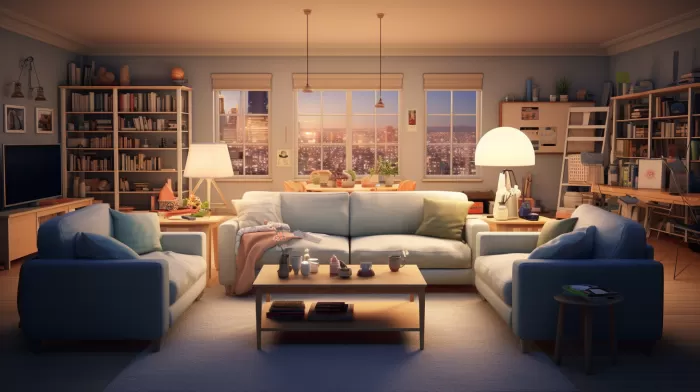As a modern society, we tend to spend a substantial amount of time with electronic devices such as cellphones and computers, especially in the evenings. However, there is one device that may be affecting your mental health if you overindulge after dinner: bright lights.
The Negative Impact of Evening Illumination
Bright and powerful light bulbs used for evening illumination can have a significant impact on your emotions. To prevent this, it is advised to keep your home dimmer in the hours leading up to bedtime.
A study led by researcher Samer Hattar, a biology professor at Johns Hopkins University’s Krieger School of Arts and Sciences, found that chronic exposure to bright light during the evening can elevate levels of cortisol, a stress hormone, in the body. This increase in cortisol can lead to depression and lower overall cognitive function.
Disruption of Cortisol Function
Cortisol, often referred to as the “stress hormone,” plays a critical role in several important functions in the body, including regulating metabolism, reducing inflammation, and controlling blood pressure. However, when cortisol is disrupted due to prolonged exposure to bright light at night, it can have a negative impact on overall mood and ability to learn.
Reducing Exposure for Better Mental Health
To reduce the negative impact of bright light exposure during the evening, Hattar recommends several practical steps:
- Switch on fewer lamps: When possible, use natural light sources instead of artificial light. Open curtains or blinds to allow sunlight into your home, and avoid turning on lamps and lights until absolutely necessary.
- Use less-intense light bulbs: Opt for lower-wattage light bulbs and consider using ambient lighting options instead of bright overhead lamps. This can create a more relaxed atmosphere and reduce the risk of cortisol disruption.
- Limit screen time in the evening: Exposure to blue light from electronic devices has been shown to negatively impact sleep and mood. By reducing screen time in the evening, you can help improve your mental well-being and increase the chances of getting a good night’s sleep.
- Implement a wind-down routine: Establish a calming routine before bedtime that allows your body and mind to relax. Read a book, practice meditation or breathing exercises, or spend time stretching to signal your body it is time for sleep.
Additional Ways to Combat Depression
Aside from reducing exposure to bright light, there are several other strategies you can try to improve your mental health and reduce symptoms of depression:
- Exercise regularly: Physical activity has been shown to help alleviate symptoms of depression and anxiety. Aim for at least 30 minutes of moderate exercise most days of the week.
- Eat a healthy diet: The food you eat can directly affect your mood and mental health. Focus on consuming whole, unprocessed foods rich in essential nutrients, such as fruits, vegetables, whole grains, lean proteins, and healthy fats.
- Stay connected: Social connections can play a critical role in mental health. Reach out to friends and family for support and ensure you allocate time for social activities in your life.
- Seek professional help: Depression is a treatable condition, and there are many professionals available to help you manage your symptoms. Reach out to a mental health professional, such as a therapist, counselor, or psychiatrist, if you’re struggling with depression.
In conclusion, while bright lights and electronic devices have become everyday staples in modern life, they may also be contributing factors to depression and impaired cognitive function. By making conscious efforts to reduce evening light exposure and adopt healthier routines, you can take steps toward improving your mental health and overall well-being.



